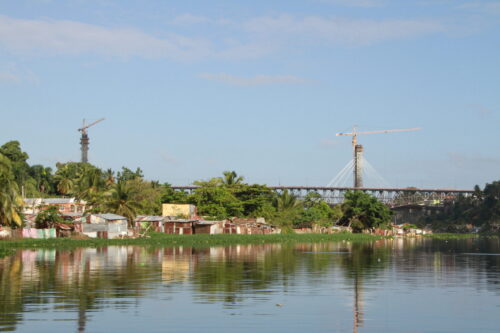Progress Toward Financing Urban Infrastructure

Progress Toward Financing Urban Infrastructure
An Update on the C40 Cities Finance Facility
March 30 | Danielle Miley
Photo: Eric Dorrejo | USAID Planning for Climate Adaptation Program | Dominican Republic
We’ve all heard the numbers – the global infrastructure investment needed to keep up with projected economic growth is severely lacking. In cities, where 54% of the world’s population now lives, it is estimated that US$4.1 to 4.3 trillion in urban infrastructure investments is needed. To make that infrastructure climate resilient and emission reducing, the estimate increases by 9-27%. As if this doesn’t seem daunting enough, in 2017, global losses from weather-related disasters (e.g. floods, wildfires, and droughts) totaled US$320 billion – the costliest year ever in terms of global weather disasters. Given future climate related risks and the need to achieve their economic growth potential, how can cities make smart infrastructure investments?
The answer lies in part with partnership efforts like the C40 Cities Finance Facility (CFF). Three years ago, USAID recognized the critical financing gap that cities face, and announced its support to the CFF at Habitat III. The CFF provides cities with the technical assistance necessary to identify and access available financing (whether public or private, domestic or international) to implement low-carbon and climate-resilient infrastructure projects. Accessing two of these sources of financing – domestic resources and private sector financing – is particularly critical to setting cities along a pathway toward self-reliance and long-term resilience. Knowledge sharing is central to the CFF model, so that successful financing approaches can be replicated where appropriate.
During its pilot phase (2016-2018), the CFF reached several milestones. The CFF provided job training, workshops, and national and international learning exchanges to support the city governments of Bogotá, Colombia, and Mexico City, Mexico on work plan development, municipal financial management, resilient transit system design principles, project finance structuring, participatory planning, and greenhouse gas (GHG) abatement analysis.
This technical assistance enabled Bogotá and Mexico City to prepare two projects for investment: a 25-kilometer climate-resilient bicycle highway called the Quinto Centenario, and a 22-kilometer zero-emission electric bus fleet and green bus corridor, respectively. Once financed, the projects will improve job commuting; avoid 85,000 metric tons of CO2 equivalent GHG emissions annually; improve stormwater management; reduce the urban heat island effect; and leverage more than $200 million in private and public investment.
The CFF also improved the capacity of 10 sub-national governmental institutions and three city administrations in five cities to assess or address climate change risks or clean energy issues. As part of this support, the CFF provided more than 650 days of training on climate change adaption and clean energy to city-level counterparts.
These initial successes have not come without their challenges. As with many cities, Bogotá, for example, is grappling with securing financing for bicycling infrastructure given the city’s limited resources, borrowing capabilities, and competing investment priorities. The CFF is helping Bogotá develop a financing model that will be sustainable and has the potential to be replicated in other cities in Colombia and regionally. The solution will require some creative thinking and may involve a combination of mobilizing domestic resources (e.g. intergovernmental transfers, municipal tax revenues or user fees), private sector finance through corporate social responsibility programs and advertising, and limited donor assistance. As the CFF helps cities like Bogotá overcome through these hurdles, it is dedicated to sharing lessons learned and best practices so that other cities can learn from the experience.
This is only the beginning of the CFF’s impact. It will add two more cities in mid-2018 and has just opened a call for applications to support a new round of cities in 2018-2019. Through the CFF, cities will be able to mobilize multiple financing sources to meet the urban climate infrastructure investment gap.
Funded by the German Federal Ministry for Economic Cooperation and Development (BMZ), the Government of the United Kingdom, and USAID, the CFF is implemented jointly by the C40 Cities Climate Leadership Group and the Deutsche Gesellschaft für Internationale Zusammenarbeit (GIZ) GmbH.
Danielle is the urban adaptation lead for USAID’s Global Climate Change Office where she provides thought leadership on climate change and urban issues. She has 14 years of technical and project management experience in both the public and private sectors with a geographic focus in Latin America and Southeast Asia.

